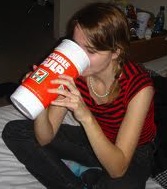 Article in today’s Wall Street Journal on the decline in consumption in the US of carbonated soda drinks, worrying companies like Coca Cola and Pepsi. Young Americans are increasingly drinking water, energy drinks and coffee. It’s of course not just a question of taste, but increasingly of health. Americans are becoming more conscious of the importance of a healthy diet and increasingly aware of how much the consumption of soft drinks is a factor in the obesity epidemic in the US. High profile actions like the recent initiative from New York mayor Bloomberg’s to ban the sale of large sodas at restaurants and movie theaters help to spread the message. The soda companies have been fighting back; Coke has a recent ad encouraging Americans to fight obesity, which has been received with considerable sardonic criticism. Drinking soft drinks – and lots of them – has been culturally entrenched in the US for decades. Tourists from abroad are often amazed by the size of American soft drinks (like 7-11’s Big Gulp) – the small size here is often equivalent to the largest size available in many other countries. When I was hiking with my son in the Black Forest, he complained about the fact that my (standard size) beer was half a liter but his (standard size) soda was .3 or even .2 liter. And no free refills! It must be that the move away from soft drinks is part of a communist conspiracy (probably from our Socialist president!) to undermine American culture, just like the sneaky move years ago to fluoridate our water (see Dr, Strangelove for the truth!).
Article in today’s Wall Street Journal on the decline in consumption in the US of carbonated soda drinks, worrying companies like Coca Cola and Pepsi. Young Americans are increasingly drinking water, energy drinks and coffee. It’s of course not just a question of taste, but increasingly of health. Americans are becoming more conscious of the importance of a healthy diet and increasingly aware of how much the consumption of soft drinks is a factor in the obesity epidemic in the US. High profile actions like the recent initiative from New York mayor Bloomberg’s to ban the sale of large sodas at restaurants and movie theaters help to spread the message. The soda companies have been fighting back; Coke has a recent ad encouraging Americans to fight obesity, which has been received with considerable sardonic criticism. Drinking soft drinks – and lots of them – has been culturally entrenched in the US for decades. Tourists from abroad are often amazed by the size of American soft drinks (like 7-11’s Big Gulp) – the small size here is often equivalent to the largest size available in many other countries. When I was hiking with my son in the Black Forest, he complained about the fact that my (standard size) beer was half a liter but his (standard size) soda was .3 or even .2 liter. And no free refills! It must be that the move away from soft drinks is part of a communist conspiracy (probably from our Socialist president!) to undermine American culture, just like the sneaky move years ago to fluoridate our water (see Dr, Strangelove for the truth!).
Of course, it’s not necessarily the case that Americans are turning away from soda to something healthier. Young Americans in particular are getting ever larger doses of caffeine. A story recently on NPR discusses the trend on American campuses for students to drink more and more coffee, as well as caffeinated energy drinks. Besides the high cost on the wallet of this trend, the cost in terms of health is high as well. High caffeine consumption interferes with getting a good night’s sleep. This can have negative consequences in terms of academics. A researcher cited in the study comments that high caffeine has been linked to decresed REM sleep, which is important for memory consolidation and learning. Of course, that’s part of the conspiracy as well – trying to get us to dump our soft drinks and switch to drinks that make us dumber!